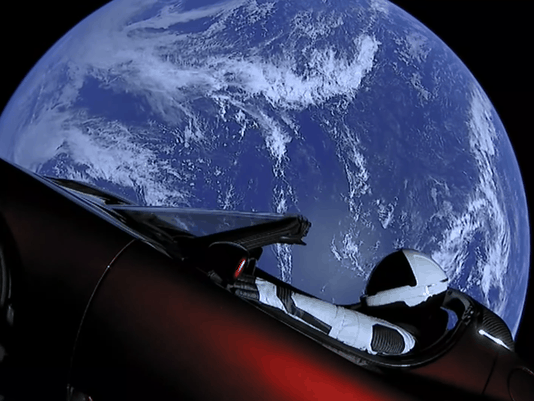
The fire and smoke have long dissipated but the excitement of Tuesday’s maiden launch of SpaceX’s Falcon Heavy rocket continues to linger as a lone red car with a mannequin “driver” makes its way through the blackness of space to the soundtrack of David Bowie.
The live photos of “Starman” in the drop-top Telsa Roadster — one hand on the steering wheel, the Earth hanging behind him — proved to be as inspiring as any image of space travel over the last 50 years.
Though it started as a publicity stunt tying billionaire Elon Musk’s electric car company to his rocket firm, the image of that car and driver in space quickly became a source of social media delight, getting posted and re-posted on web pages around the world.
A new rocket flying a demonstration flight would typically launch something like a block of concrete to simulate the mass of a spacecraft, but Musk and SpaceX decided that was way too boring.
Not since 1977, when NASA launched the Voyager I probe with two “Golden Records” — phonographic albums containing sounds and images selected to portray the diversity of life and culture on Earth for any intelligent extraterrestrial life with a record player — has a cultural artifact sparked such interest.

And like those records, the Starman and his ride are set to keep going and going and going. Musk’s plan is for the $100,000 Tesla Roadster — with the message “Don’t panic!” stamped on the dashboard — to cruise through high-energy radiation belts towards deep space.
Musk confirmed late Tuesday that a final burn by the Falcon Heavy’s upper stage engine had successfully initiated a “trans-Mars injection” boosting the car into an orbit around the sun stretching way beyond Mars.
“Third burn successful,” Musk reported on Twitter. “Exceeded [the trajectory towards] Mars orbit and kept going to the Asteroid Belt.”
Batteries powering the camera views of the Roadster were only expected to last about 12 hours, so they won’t provide close-up views of the car near Mars or an asteroid, but that was never the idea. Just like the car’s sound system possibly playing David Bowie’s Space Oddity, a song about an astronaut who is lost forever to the void, that can never be heard because sound can’t travel in the vacuum of space, the goal was to mesmerize.
“I think the imagery of it is something that’s going to get people excited around the world,” Musk said. “And it’s still tripping me out.”
He noted that outside of the earth’s atmosphere, the car’s cherry-red color looked “kind of weird, ” too crisp” — proof that it was real.
“You can tell it’s real because it looks so fake,” he joked. “It’s just literally a normal car in space, which I kind of like the absurdity of that.”
“It’s kind of silly and fun, but I think silly, fun things are important,” he added.
Indeed, the photo of that surreal red car and the silliness it represents have served to ignite the imaginations of millions around the globe.
Thousands traveled to the Space Coast to witness the 3:45 p.m. ET demonstration flight from Kennedy Space Center’s pad 39A, jamming roads for hours after liftoff of the world’s most powerful rocket. Hundreds of media representatives reported on the event, one of the biggest turnouts since the last space shuttle launch in July 2011 and NASA’s Orion capsule flight test in December 2014.

Their visit was further rewarded eight minutes after liftoff when two of the rocket’s side cores performed a tandem landing at Cape Canaveral Air Force Station and generated back-to-back sonic booms during the propulsive descents.
Even Musk’s rivals applauded him. As for Musk, with the mostly successful first flight out of the way (minus losing the center core during an attempted landing on a drone ship), Falcon Heavy is likely a few months away from launching on its first contracted missions. The company has obtained contracts from the Air Force, Arabsat and ViaSat to launch payloads to orbit.
But the three-core launch vehicle isn’t just limited to commercial or military payloads.
“Falcon Heavy opens up a new class of payload,” Musk said Tuesday. “It can launch things direct to Pluto and beyond, no stop needed. You don’t even need a gravity assist or anything.”
“It can do anything you want,” he said.
